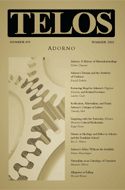Eric S. Nelson’s “Revisiting the Dialectic of Environment: Nature as Ideology and Ethics in Adorno and the Frankfurt School” appears in Telos 155 (Summer 2011). Read the full version online at the Telos Online website, or purchase a print copy of the issue in our store.
 As a contribution to a responsive and critical materialist ethics of environments and animals, this essay reexamines the significance of nature and animals in the critical social theory of Theodor Adorno. In response to the anthropocentric stance of intersubjective discourse and recognition in recent figures associated with the Frankfurt School, such as Jürgen Habermas and Axel Honneth, I argue for the ecological import of the aporetic dialectic of nature and society in Adorno and Horkheimer’s Dialectic of Enlightenment and Adorno’s later works. Adorno’s continuing confrontation with the “domination of nature” traces the tensions between the ideological construction and resistance of “nature” as well as the instrumentalization and implicit disruptive promise of sensuous life. These tensions indicate the material and bodily bonds between human and animal happiness and suffering and the ambiguous role of mimesis in both domination and emancipation. Adorno insisted on the critical prospect of an unforced and non-coercive freedom that brings us toward the object and responsibility for socially and historically mediated and non-identical natural life.
As a contribution to a responsive and critical materialist ethics of environments and animals, this essay reexamines the significance of nature and animals in the critical social theory of Theodor Adorno. In response to the anthropocentric stance of intersubjective discourse and recognition in recent figures associated with the Frankfurt School, such as Jürgen Habermas and Axel Honneth, I argue for the ecological import of the aporetic dialectic of nature and society in Adorno and Horkheimer’s Dialectic of Enlightenment and Adorno’s later works. Adorno’s continuing confrontation with the “domination of nature” traces the tensions between the ideological construction and resistance of “nature” as well as the instrumentalization and implicit disruptive promise of sensuous life. These tensions indicate the material and bodily bonds between human and animal happiness and suffering and the ambiguous role of mimesis in both domination and emancipation. Adorno insisted on the critical prospect of an unforced and non-coercive freedom that brings us toward the object and responsibility for socially and historically mediated and non-identical natural life.


